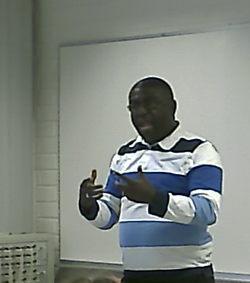Notes from the IPID ICT4D PG symposium 2008, Mekrijärvi Research Station, Joensuu University, Finland. 8 and 9 September, 2008.
Nelson Godfried Agyemang, University of Pretoria: A Sustainability Framework for Advanced ICT Education in a Developing country

Nelson Godfried Agyemang
How to make sustainable Postgraduate in ICT education programmes in developing countries.
Action research methodology.
Kurt Lewin’s iterative process: diagnose, action planning, action taking, evaluating, specifying learning.
Important point: not to take research for consultancy.
Different sustainability stages: outcomes, processes, context, etc.
In the digitizing sustainability, not everything can be digitized.
Tersia Gowases, University of Joensuu: Impacts of Higher Education Institutions of an Information Society
Background: Edulink fosters ICT development in Africa. Its objective is to foster capacity building and regional integration in higher education in ACP States and Regions, and to promote higher education as a means of reducing poverty
.
In this framework, see what’s the role of the combination of Higher Education and Computer Science (e.g. degrees in computer science).
Perspectives: technological, economical, occupational, spatial, cultural.
Joseph M Longino, Lappeenranta University of Technology: Evaluation of Implementation of BSc IT curriculum at Tumaini University
The “C” in ICTs, as a difference with IT.
Background of ICT in Tanzania: post independence situation, development of ICT in Higher Education Institutions, public sector and SMEs reforms to include ICTs. ICTs have been really useful for SMEs to access remote information.
International standard curricula bodies for Computer Science: IFIP, UNESCO.
Curricula models and development: IEEE & ACM (1991 & 2001), UNESCO (1999).
Create a curriculum for a Bsc IT, following the six principles as input: contextualization, international recognition, project based, practical orientation, research based, interdisciplinary orientation.
Challenges: to move ICTs from entertainment to promoting change, by meeting social expectations in an efficient use.
Haider Abbas, Asad Raza, Royal Institute of Technology, Sweden: Security Evaluation of ESAM Software
How to do security evaluation using Architecture Tradeoff Analysis Method (ATAM)? How to promote time/cost-effective security evaluation of Software Architectures in developing countries?
Security is considered a cost overhead in developing countries and so is often left unattended.
A new framework based on ESAM Software to make it easier.
Carolina Islas, University of Joensuu: Playing and Sharing knowledge through the use of portable devices, formally known as Mobile Phones
How is gaming and sharing knowledge relevant for ICT4D? Knowledge sharing for development.
Development according to Van Wagner: the growth of humans throughout the lifespan.
SECI model: socialization, externalization, combination, internalization. This is what happens in the sequence of gaming from a scenario towards a goal.
If we can shift content and education to the mobile zone arena — being mobile phones the most evenly distributed ICTs — then we can make some broad impact in knowledge shared based development. Mobile pervasive gaming is a vehicle to support learning.
Third Annual ICT4D Postgraduate Symposium (2008)
If you need to cite this article in a formal way (i.e. for bibliographical purposes) I dare suggest:
Peña-López, I. (2008) “Third Annual ICT4D Postgraduate Symposium (III). Thematic session 2: Education” In ICTlogy,
#60, September 2008. Barcelona: ICTlogy.
Retrieved month dd, yyyy from
https://ictlogy.net/review/?p=962
Previous post: Third Annual ICT4D Postgraduate Symposium (II). Thematic session 1: IT governance, participation, e-learning, m-development
Next post: Third Annual ICT4D Postgraduate Symposium (IV). Thematic session 3: sustainability and performance
 RSS feed for comments on this post.
TrackBack URI
RSS feed for comments on this post.
TrackBack URI

